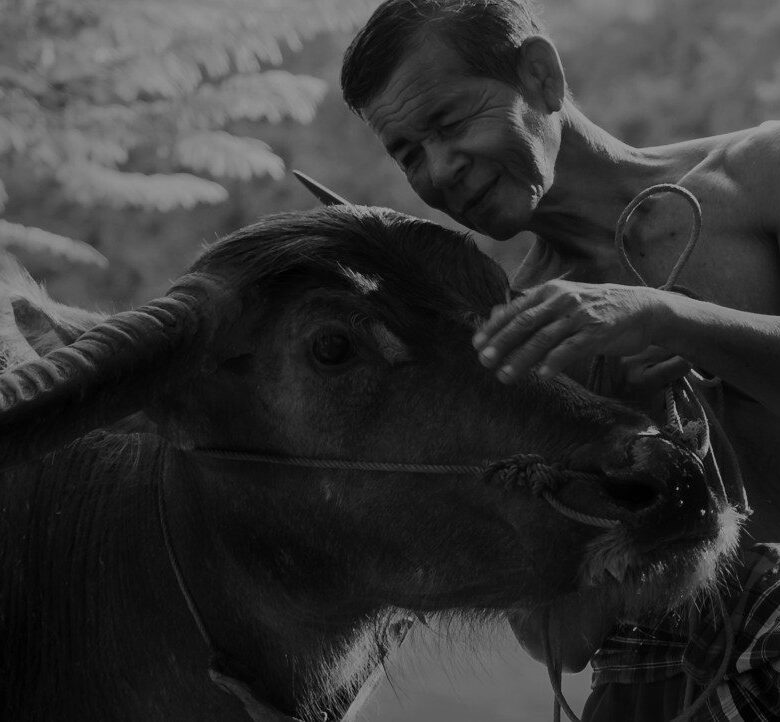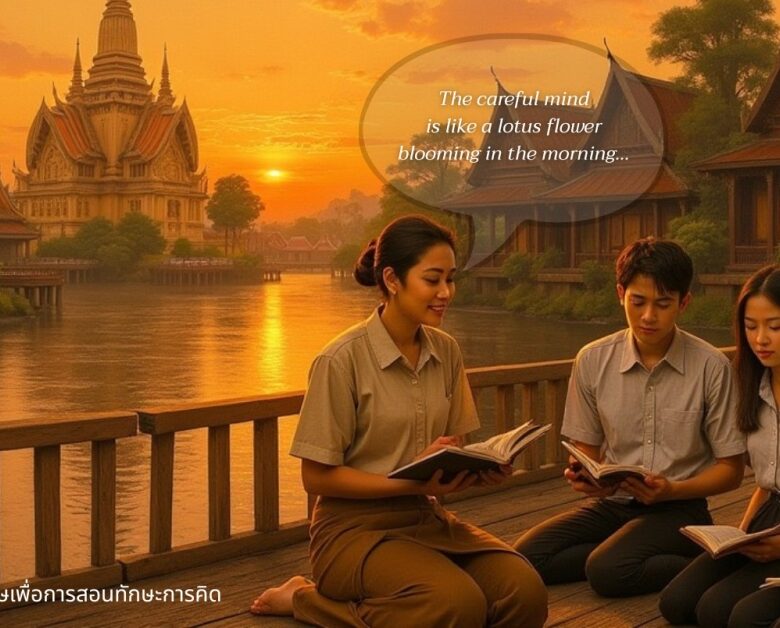"The book’s teachings reinforce a Thai worldview where inner strength is not displayed loudly. It grows slowly, like a quiet spirit awakening bit by bit."
Self-Help for Thai Students
T
here is a kind of wisdom that does not arrive with urgency. It grows gradually, the way morning light moves across rice paddies after a cool Isaan night in Thailand.
Life Lessons from Isaan, a bilingual Thai–English self-improvement book by Ajarn David, enters that gentle space. Rather than pushing readers to chase external milestones, it guides them toward strengthening the inner life through steady effort, honest reflection, and sincere practice — a distinctly Thai self-development approach rooted in kindness and patience.
Published by Ysaan Books in June 2025, the book first began as a Thai teaching text titled เมล็ดใจบาน บทเรียนชีวิตจากอีสาน, created for university students in Sakon Nakhon in Northeast Thailand. Over time, it developed into a dual-language guide with short teachings, hand-drawn illustrations, and simple real-life examples drawn from everyday Thai life to clarify universal self-development principles like patience, self-reliance, gratitude, and self-discipline.
The book does not romanticize rural life; instead, it uses ordinary experiences familiar across Thailand — visiting temples at dawn, preparing sticky rice, talking with elders, bicycling through quiet roads, helping neighbors — as practical and relatable examples of inner growth. Personal development here is not framed as performance or competition, but as daily self-improvement through small, meaningful choices. It reflects a Thai way of living that values sincerity, harmony, and mindful action.
Ajarn David's Approach
A
jarn David has taught at universities in Thailand since 2002, after earlier years teaching in the Czech Republic and traveling through Europe.
His long commitment to Thai students, his life in Isaan villages, and his cultural projects like MySakonNakhon.com shape the voice of a teacher who writes from lived experience rather than theory.
Books like Poems from Sakon Nakhon and Why Thailand show his appreciation for Thai culture and the values embedded in everyday Thai life.
His writing is neither touristic nor mystical; it is grounded, human, and aware of how people really grow over time.
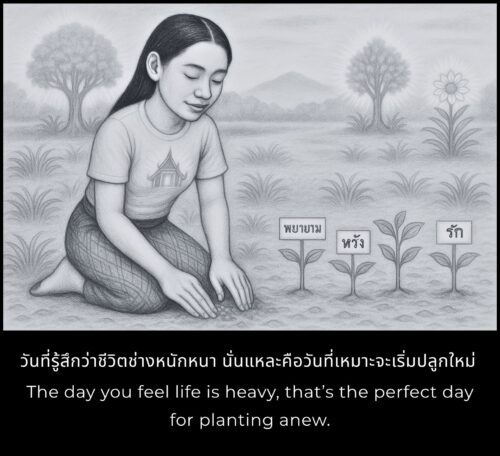
Self-Development in Real Thai Life
T
he book’s self-improvement lessons appear through ordinary scenes.
A student practicing quietly after failing an exam demonstrates perseverance. A farmer tending saplings through drought models patience and hope.
These anecdotes are not sentimental snapshots of rural Thailand — they are tools for teaching self-development. They show how resilience is built in kitchens, fields, classrooms, and markets, not just in meditation halls or seminar rooms.
In the opening chapter, the heart is compared to a rice field awaiting seeds. Encouraging thoughts plant healthy crops; doubt grows weeds; the words “I will try again tomorrow” become a drop that ripples outward like a pond at Nong Han Lake.
This Thai metaphor places self-improvement in daily soil rather than abstract theory: consistency over intensity, sincerity over ambition, gentle discipline over force.
The Voice of Thai Confidence
A nother chapter explores authenticity. In Thai culture, humility (ถ่อมตน) and social harmony matter, yet true self-confidence also exists quietly beneath the surface.
A young person who dyes indigo cloth in their own style, or someone returning home to farm in Isaan despite urban pressure, demonstrates a Thai form of courage — calm, steady, unboastful.
Where Brené Brown’s The Gifts of Imperfection encourages embracing vulnerability, Life Lessons from Isaan shares the same spirit through village silence rather than a global stage.
True voice here is not loud or defiant. It is gentle truth spoken with kindness, a form of self-development that balances confidence with respect — a core aspect of Thai emotional culture.
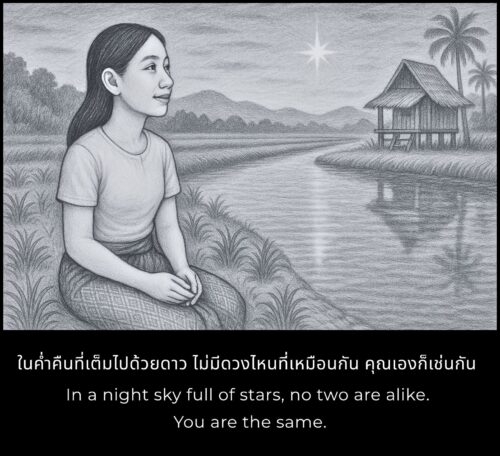
Thai-Style Daily Growth
W
here many Western self-improvement books emphasize optimization and productivity tracking, Life Lessons from Isaan presents a Thai style of self-development grounded in steady action and daily goodwill.
You do not need to track every habit or wake up at 5 a.m. to be worthy. A moment of kindness in a Thai fresh market, a decision to study English for 20 minutes after dinner, choosing to breathe instead of reacting with frustration — these are meaningful acts of self-improvement in Thailand’s cultural rhythm.
Progress becomes a path walked calmly, like strolling through a Thai morning market where each stall holds a small possibility. Self-development is not a sprint; it is a gentle daily walk.
A Balanced Counterpoint to Modern Self-Help
P
opular books like Mark Manson’s The Subtle Art of Not Giving a F*ck, Robin Sharma’s The 5 AM Club, and Eckhart Tolle’s The Power of Now offer valuable insights: let go of trivial worries, build discipline, stay present.
Yet Life Lessons from Isaan differs in tone and method. It teaches presence not through withdrawal from the world but through participating with intention. It encourages discipline not through dramatic morning rituals, but through steady living — like Thai aunties preparing food before dawn or farmers walking to the fields every day of planting season.
Instead of asking how to be more productive, this Thai self-improvement book asks how to be more sincere. Instead of measuring success by output, it measures it by heart.
The book’s teachings reinforce a Thai worldview where inner strength is not displayed loudly. It grows slowly, like a quiet spirit awakening bit by bit.
A baker trying again after doubt, a teacher refining lessons after discouragement, a grandmother singing folk songs despite trembling voice — these everyday stories show how Thai determination works: gentle, patient, and persistent.
Self-development here looks like growth in small steps, practiced each day with dignity.
Love, Goodness, and Purpose
L
ove in this book is not drama. It is Thai-style generosity: sharing grilled chicken with neighbors, offering a friendly smile, forgiving small hurts, caring for elderly family members quietly without recognition.
Love appears in actions, not speeches. Forgiveness is not weakness; it is cleansing, like rinsing dust from the heart. Doing good without expecting reward — ทําดีได้ดี — is a Thai self-improvement principle rooted in karma, merit, and compassion.
Meanwhile, purpose in Life Lessons from Isaan does not demand extraordinary ambition. It could be opening a noodle stall, starting a garden, studying English each morning, or raising a family with care.
A dream need not be grand to be meaningful. Purpose becomes a lamp that guides through hardship. Mastery comes from daily practice — like rice wine fermenting slowly during rainy season, or Thai artisans improving their craft over time.
Self-development here values devotion, focus, and daily action.
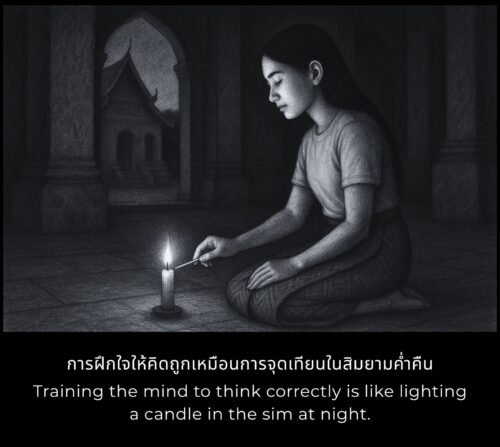
Mindfulness, Truth & Everyday Thai Wisdom
T
he book later turns toward meditation and awareness — not as ceremonial practices reserved for temples, but as simple habits for daily Thai life.
Breathing before reacting, observing emotion without attacking oneself, offering kindness first — these are mindfulness techniques practiced in homes, buses, markets, and school hallways across Thailand. Self-improvement becomes a temple built inside the heart, not outside it.
Truth is compared to a steady flame in the kitchen, illuminating quietly. Small lies create smoke, clouding judgment; sincerity keeps flavor true.
Wisdom in Thailand often belongs to those who do humble tasks with care — sweeping temple floors, preparing food before dawn, showing respect to elders. Dignity grows not from attention but from quiet integrity.
This is Thai self-development grounded in character rather than competition.
A Genuine Path to Self-Improvement in Thailand
L
ife Lessons from Isaan stands apart in the self-improvement genre by choosing calm over urgency.
Its bilingual format aids Thai learners and expats; its Thai values of patience, mindfulness, family, and compassion appeal to anyone seeking deeper meaning. It does not promise instant transformation. It invites planting one small seed of self-development each day and nurturing it.
For readers drawn to Thai culture, Buddhist-influenced self-improvement, and personal growth rooted in sincerity, this book offers a genuine companion — one that grows with you, one small act at a time.




